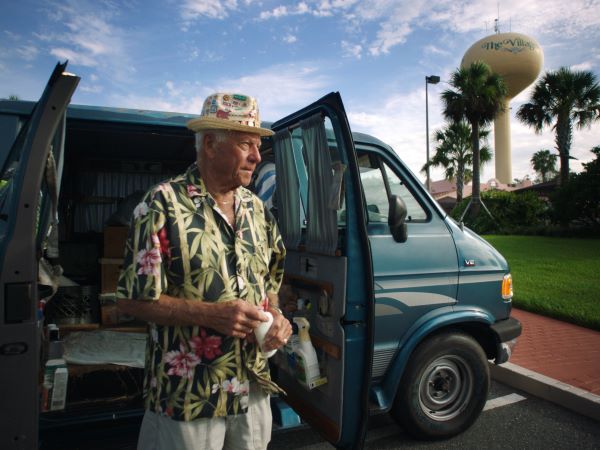

This intriguing, often surreal documentary takes place in the largest retirement community in the United States, The Villages, where, as an interviewee says, “When you live here, you become younger.” The accompanying montage features seniors golfing and playing tennis with verve, gathering in social clubs, and enjoying the many nightlife options. It doesn’t take long, however, to see there are limits to how much fun anyone can have here, even with its reputation for partying seven days a week.
Among the 50,000-plus inhabitants of the community are a longtime married couple, Anne and Reggie, whose problems begin when Reggie starts experimenting with drugs. Some of the most intense moments center on his increasing disentanglement from reality thanks to narcotics, a process that is at first dryly amusing but quickly takes on ominous tones. A memorable shot involves him meditating waist-deep in a golf course pond as lightning crashes behind him. Director Lance Oppenheim filters much of Reggie’s behavioral change through Anne, often holding the lens tight on her face as she observes her husband with growing concern.
The film alternates between the couple and two other story lines. Barbara had moved to the central Florida-based setting with a husband, but he abruptly passed on. Given the community’s reputation for singles clubs, she eventually looks for love and companionship again. Dennis a fast-talking, tanned, 81-year-old single, doesn’t live in The Villages; rather, he drove there in his van—the one he also lives out of—with the goal of finding a rich woman who will take care of him.
At one point, someone compares moving to this supposed retiree’s paradise with going away to college for the first time, and there is something to that. Unfettered by their past lives and connections, the protagonists are free to reinvent themselves, with ill-fitting results at times. Reggie, for example, never seems remotely cool or enlightened, no matter how many illicit chemicals he takes. On the contrary, he always gives off the vibe of somebody’s goofy grandfather. Similarly, Barbara tries becoming a parrothead (the term for a serious Jimmy Buffett fan) in order to impress a Buffett-loving heartthrob, while Dennis tells every lady who’ll listen that he’s quality husband material. (He emphasizes repair skills that he never demonstrates.) Neither is very convincing.
All three narratives have their own internal conflicts, but Oppenheim also seems interested in exploring how being in The Villages—where residents seem to take a keen interest in their neighbors’ personal business—adds a further layer of complexity. For instance, poor Anne has enough on her plate without the procession of visitors who express concern about Reggie. Dennis, meanwhile, sees his search for a “sugar mama” complicated by threats by homeowners. They make it very clear that outsiders like him aren’t welcome in the neighborhood, though he ostensibly parks his van on public streets.
Given how seniors tend to be depicted in movies (whether in fiction or nonfiction) as levelheaded and contented, if not worldly and wise, it’s refreshing to see the subjects of this universe as they are: confused, naïve, and occasionally self-destructive. The further each falls down a rabbit hole, the more unreal the film’s tone becomes, though Oppenheim never seems to be gawking, but rather he is sincerely along for the ride.
The film is particularly empathic toward Anne and Barbara, the latter of whom ventures from one social group to another where she sticks out because of her awkwardness and lack of cheer, yet we get the sense that the filmmakers are rooting for her to find her way. In one scene, she attends an acting class, and when the instructor asks for volunteers, the camera lingers on her face prolongedly, glimpsing the inner conflict within her regarding whether to give it a try. Even Dennis, who would seem the easiest to dislike because of his naked self-interest, has moments in which the camera glimpses his vulnerability—specifically, when his plans start to falter and despair creeps in.
Some Kind of Heaven marks Oppenheim’s feature debut, and he gives us an in-depth look at an unusual place populated by folks who have a lot more going on than we might first have expected.
















Leave A Comment